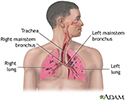Cor pulmonale
Right-sided heart failure; Pulmonary heart disease
Cor pulmonale is a condition that causes the right side of the heart to fail. Long-term high blood pressure in the arteries of the lung and right ventricle of the heart can lead to cor pulmonale.
Causes
High blood pressure in the arteries of the lungs is called pulmonary hypertension. It is the most common cause of cor pulmonale.
In people who have pulmonary hypertension, changes in the small blood vessels inside the lungs can lead to increased blood pressure in the right side of the heart. This makes it harder for the heart to pump blood to the lungs. If this high pressure continues, it puts a strain on the right side of the heart. That strain can cause cor pulmonale.
Lung conditions that cause a low blood oxygen level in the blood over a long time can also lead to cor pulmonale. Some of these are:
- Autoimmune diseases that damage the lungs, such as scleroderma
- Chronic obstructive pulmonary disease (COPD)
- Chronic blood clots in the lungs
- Cystic fibrosis (CF)
- Severe bronchiectasis
- Scarring of the lung tissue (interstitial lung disease)
- Severe curving of the upper part of the spine (kyphoscoliosis)
- Obstructive sleep apnea, which causes stops in breathing because of airway inflammation
- Idiopathic (no specific cause) tightening (constriction) of the blood vessels of the lungs
- Severe left-sided heart failure
Symptoms
Shortness of breath or lightheadedness during activity is often the first symptom of cor pulmonale. You may also have a fast heartbeat and feel like your heart is pounding.
Over time, symptoms occur with lighter activity or even while you are at rest. Symptoms you may have are:
- Fainting spells during activity
- Chest discomfort, usually in the front of the chest
- Chest pain
- Swelling of the feet or ankles
- Symptoms of lung disorders, such as wheezing or coughing or phlegm production
- Bluish lips and fingers (cyanosis)
Exams and Tests
Your health care provider will perform a physical exam and ask about your symptoms. The exam may find:
- Fluid buildup in your belly
- Abnormal heart sounds
- Bluish skin
- Liver swelling
- Swelling of the neck veins, which is a sign of high pressure in the right side of the heart
- Ankle swelling
These tests may help diagnose cor pulmonale as well as its cause:
- Blood antibody tests
- Blood test to check for a substance called brain natriuretic peptide (BNP)
- Chest x-ray
- CT scan of the chest, with or without an injection of a contrast fluid (dye)
- Echocardiogram
- ECG
- Lung biopsy (rarely done)
- Measurement of blood oxygen by checking arterial blood gas (ABG)
- Pulmonary (lung) function tests
- Right heart catheterization
- Ventilation and perfusion scan of the lungs (V/Q scan)
- Tests for autoimmune lung disease
Treatment
The goal of treatment is to control symptoms. It is important to treat medical problems that cause pulmonary hypertension, because they can lead to cor pulmonale.
Many treatment options are available. In general, the cause of your cor pulmonale will determine which treatment you receive.
If your provider prescribes medicines, you may take them by mouth (oral), receive them through a vein (intravenous or IV), or breathe them in (inhaled). You will be closely monitored during treatment to watch for side effects and to see how well the medicine works for you. Never stop taking your medicines without first talking to your provider.
Other treatments may include:
- Blood thinners to reduce the risk of blood clots
- Medicines to manage heart failure symptoms
- Oxygen therapy at home (as in most cases of cor pulmonale, oxygen is low)
- A lung or heart-lung transplant, if medicine does not work
Important tips to follow:
- Avoid strenuous activities and heavy lifting.
- Avoid traveling to high altitudes.
- Get a yearly flu vaccine, as well as other vaccines, such as the pneumonia vaccine, and the COVID vaccine.
- If you smoke, stop.
- Limit how much salt you eat. Your provider also may ask you to limit how much fluid you drink during the day.
- Use oxygen if your provider prescribes it.
- Women should not get pregnant.
Outlook (Prognosis)
How well you do depends on the cause of your cor pulmonale.
As your illness gets worse, you will need to make changes to your home so that you can manage as well as possible. You will also need help around your house.
Possible Complications
Cor pulmonale may lead to:
- Life-threatening shortness of breath
- Severe fluid buildup in your body
- Shock
- Death
When to Contact a Medical Professional
Contact your provider if you have shortness of breath or chest pain.
Prevention
Do not smoke. Smoking causes lung disease, which can lead to cor pulmonale.
References
Lammi MR, Mathai SC. Pulmonary hypertension: general approach. In: Broaddus VC, Ernst JD, King TE, et al, eds. Murray and Nadel's Textbook of Respiratory Medicine. 7th ed. Philadelphia, PA: Elsevier; 2022:chap 83.
Maron B. Pulmonary hypertension. In: Libby P, Bonow RO, Mann DL, Tomaselli GF, Braunwald E, eds. Braunwald's Heart Disease: A Textbook of Cardiovascular Medicine. 12th ed. Philadelphia, PA: Elsevier; 2022:chap 88.
Sarcoid, stage IV - chest x-ray - illustration
Sarcoid, stage IV - chest x-ray
illustration
Acute vs. chronic conditions - illustration
Acute vs. chronic conditions
illustration
Cor pulmonale - illustration
Cor pulmonale
illustration
Respiratory system - illustration
Respiratory system
illustration
Review Date: 1/20/2022
Reviewed By: Denis Hadjiliadis, MD, MHS, Paul F. Harron, Jr. Associate Professor of Medicine, Pulmonary, Allergy, and Critical Care, Perelman School of Medicine, University of Pennsylvania, Philadelphia, PA. Also reviewed by David Zieve, MD, MHA, Medical Director, Brenda Conaway, Editorial Director, and the A.D.A.M. Editorial team.


























